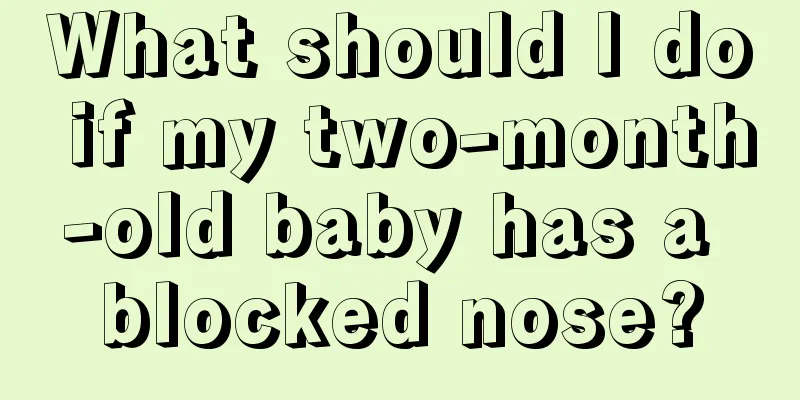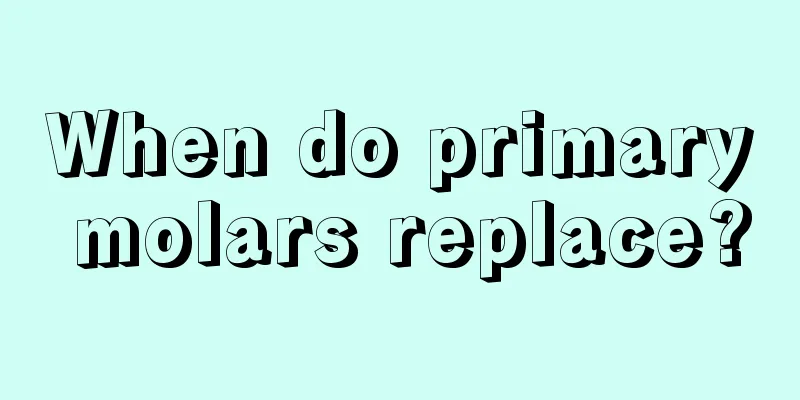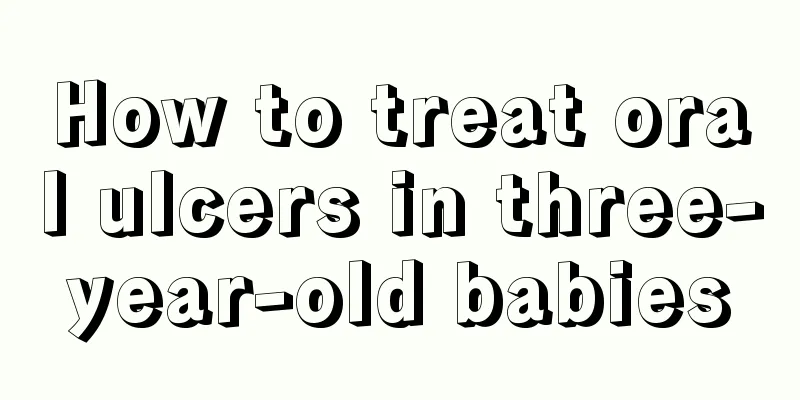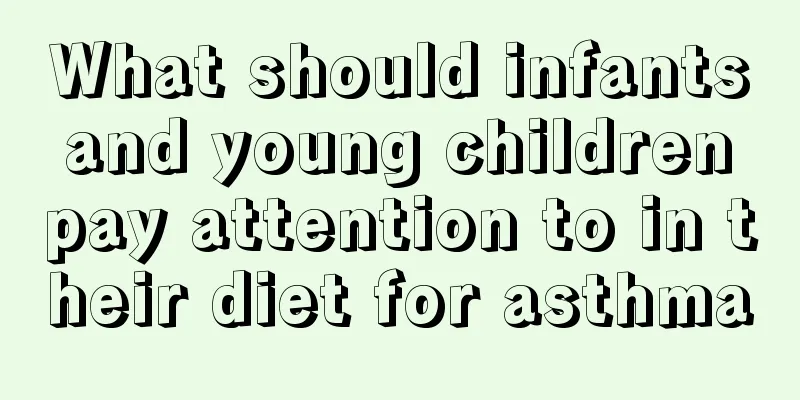Baby oral care should be done this way to be effective
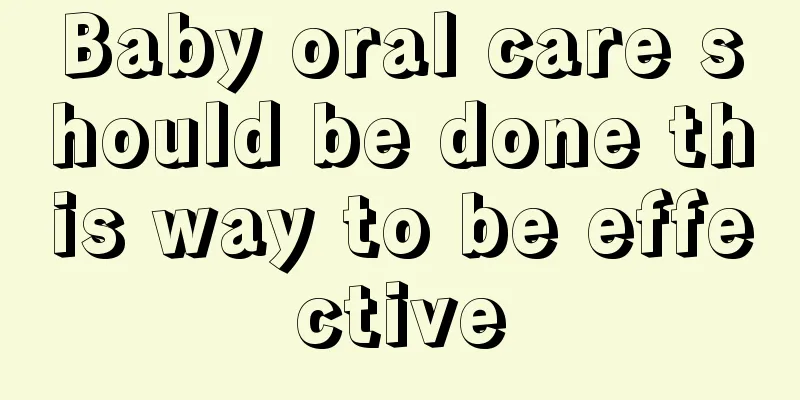
|
We all know that children need to brush their teeth more often when they grow up, especially after they have grown teeth, they must brush their teeth to keep their teeth clean. However, even if babies have not grown teeth, we should also pay attention to oral care. Because babies often breastfeed, there will be milk residue in their mouths, which will have a smell for a long time. The baby's oral hygiene can be cleaned by drinking more water and using manual cleaning methods. Baby oral hygiene care knowledge 1. Oral care during the neonatal period (1) Throughout the neonatal period (from birth to 28 days), babies should be fed small amounts of warm water to clean their mouths. (2) Regardless of whether you are breastfeeding or bottle-feeding, you should develop the habit of drinking a small amount of boiled water after each feeding. Especially when your baby has a fever or a cold, you should feed him warm boiled water more often. (3) For babies who are bottle-fed and whose milk sucking speed is slow or who stop and start eating, the mother should not use the rubber nipple to press against the baby's oral mucosa to urge the baby to suck. Such frequent operations can easily damage the baby's oral mucosa. (4) Strictly maintain the hygiene of nipples and feeding utensils. For breastfed babies, it is important for mothers to keep their nipples clean. Before each breastfeeding, mothers should wash their hands and nipples with soap, and the towel used to wipe the nipples should be disinfected with hot water first. For babies who are bottle-fed, the bottles and nipples should be rinsed thoroughly with clean water before use. (5) The temperature of the prepared milk powder should be appropriate. Test the temperature on your arm before feeding. If the milk temperature is high, it can easily burn the baby's oral mucosa. 2. Oral care before deciduous teeth grow Generally speaking, babies will start to grow teeth at 6 months old (sometimes earlier), and will be accompanied by some uncomfortable symptoms, such as swollen gums, fever, pain, etc. Mothers must learn to judge the discomfort symptoms of baby's teething and provide correct care. Before giving your baby oral care, you need to do some preparation. First, let the baby lie on his side, and wrap a small towel or bib bag under his jaw to prevent his clothes from getting wet during care; at the same time, prepare sterilized chopsticks, cotton swabs, light salt water and warm water, and the mother should wash her hands with soap and running water. Wait until everything is ready before starting care. When caring for the baby, first use a cotton swab dipped in light salt water or warm water to wipe the baby's cheeks and the outside of the gums, then wipe the inside of the gums and the tongue. For babies who refuse to open their mouths, parents can pinch the baby's cheeks with the thumb and index finger of their left hand to make them open their mouths. If necessary, they can also use the handle of a spoon or chopsticks to help open the mouth, but be sure not to use too much force as it will hurt the child. When scrubbing, care should be taken to keep the items used clean and hygienic, and to prevent the disinfected items from becoming dirty and contaminated. Use a new cotton swab when scrubbing a part, and do not dip too much liquid on the cotton swab to prevent the baby from inhaling liquid into the respiratory tract and causing danger. After oral care, wipe the corners of your baby's mouth clean with a small towel. For chapped lips, apply disinfected clean vegetable oil; for oral ulcers, apply chloramphenicol cod liver oil; for thrush, apply nystatin glycerin, or apply other medicines as needed as prescribed by the doctor. 3. Oral care after teething For babies under 1 year old, when their baby teeth just grow out, use a fingertip toothbrush or gauze dipped in warm water to gently wipe the baby teeth and gums. Teeth cleaning should also be done regularly, once in the morning and evening every day, and once after the last feeding at night, to avoid milk remaining in the mouth for a long time, which can easily cause tooth decay. After the age of 1, choose a toothbrush and toothpaste combination specifically for infants and young children. |
<<: Can Shuanghuanglian oral liquid for children treat sore throat?
>>: How to take care of baby's dry eczema
Recommend
This kind of breakfast can keep children healthy
1. Purple sweet potato cake + fruit soup + boiled...
Things to note when your 1-year-old baby is teething
Teething is an important milestone in a baby'...
Causes of yellow hair in children
Generally speaking, in daily life, many children&...
Can a newborn baby's belly button touch water?
Generally speaking, a newborn baby has an umbilic...
What toothbrush should I use for a 1.5 year old baby?
Some parents pay great attention to oral hygiene,...
What should we pay attention to when babies take calcium gluconate?
For newborn babies, I believe that moms and dads ...
What is the best age to learn Taekwondo?
Nowadays, Taekwondo is not a skill that only boys...
Several dietary treatment methods for children with nephrotic syndrome
Here are some dietary treatments for children wit...
What should I do if my child has a fever and is having convulsions?
Children usually don't pay attention to their...
What is the recovery period for infant pneumonia?
Nowadays, every child is the treasure of the fami...
Is it good to give your baby a bath at night?
There are still many things to pay attention to w...
Is a child's temperature of 38.3 degrees considered a fever?
Once they find that their children have a fever, ...
The symptoms of papules in children are actually very obvious
Once infants and young children suffer from papul...
What to do if a child has a fish bone stuck in his throat?
In this hot summer, many friends like to go to th...
What are the nutritional soups for children?
Nutritious soup is a favorite choice of many peop...

